Posts Tagged ‘Arakan/Rakhine’ (131 found)
Burma: USCIRF Issues Report on Religious Freedom and Related Human Rights Violations
WASHINGTON, DC – On the eve of President Obama’s November 12-14 trip to Burma, the U.S. Commission on International Religious Freedom (USCIRF) today released a new report, “Burma: Religious Freedom and Related Human Rights Violations are Hindering Broader Reforms.” The report and its recommendations reflect a USCIRF Commissioner-level visit to Burma in August 2014 by Commissioners M. Zuhdi Jasser and Eric P. Schwartz and two USCIRF staff. […]
• • •Locals Protest against Using Palace Ruins in Road Construction
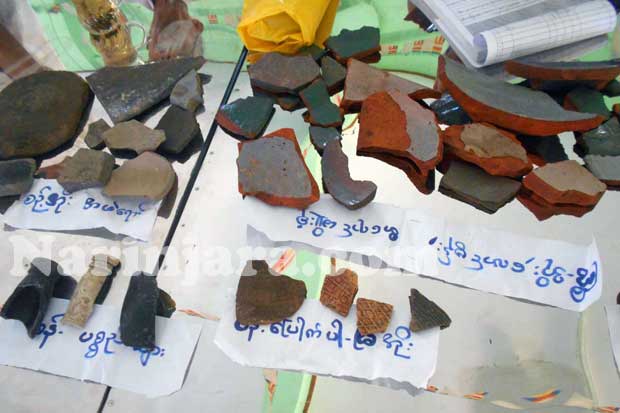 The indigenous people of Arakan raise voices against the use of soil and stone splinters from the Mrouk Oo ancient palace on the construction of roads in the State. They also expressed their resentments that a huge volume of royal palace ruins including the historically important soil was used in repairing some city walls in different locations.
The indigenous people of Arakan raise voices against the use of soil and stone splinters from the Mrouk Oo ancient palace on the construction of roads in the State. They also expressed their resentments that a huge volume of royal palace ruins including the historically important soil was used in repairing some city walls in different locations.
According to an eye witness, the authority has used various stones, brick tiles of ancient monuments in the road construction activities. “We saw many valuable ancient tools, which were dig-out from the palace ground, are now being used in the construction of roads,” said the local eye witness […]
• •Myanmar: The Politics of Rakhine State
The situation in Rakhine State contains a toxic mixture of historical centre-periphery tensions, serious intercommunal and inter-religious conflict with minority Muslim communities, and extreme poverty and under-development. This led to major violence in 2012 and further sporadic outbreaks since then. The political temperature is high, and likely to increase as Myanmar moves closer to national elections at the end of 2015. It represents a significant threat to the overall success of the transition, and has severely damaged the reputation of the government when it most needs international support and investment. Any policy approach must start from the recognition that there will be no easy fixes or quick solutions. The problems faced by Rakhine State are rooted in decades of armed violence, authoritarian rule and state-society conflict. This crisis has affected the whole of the state and all communities within it. It requires a sustained and multi-pronged response, as well as critical humanitarian and protection interventions in the interim […]
• • •Media Release – Myanmar: The Politics of Rakhine State
The highly volatile situation in Myanmar’s Rakhine State adds dangerously to the country’s political and religious tensions. Long-term, incremental solutions are critical for the future of Rakhine State and the country as a whole […]
• • •UN General Assembly Resolution must Keep the Spotlight on Serious Human Rights Violations
New York, Paris, Bangkok – A UN General Assembly’s Third Committee resolution must continue to address serious human rights violations in Burma, FIDH and its member organization Alternative ASEAN Network on Burma (ALTSEAN-Burma) urged Permanent Missions to the UN during a visit by an FIDH-organized to New-York […]
• • •Demanding Justice for Migrant Arakanese Youths, Demonstration in Front of Thai Consulate in New York
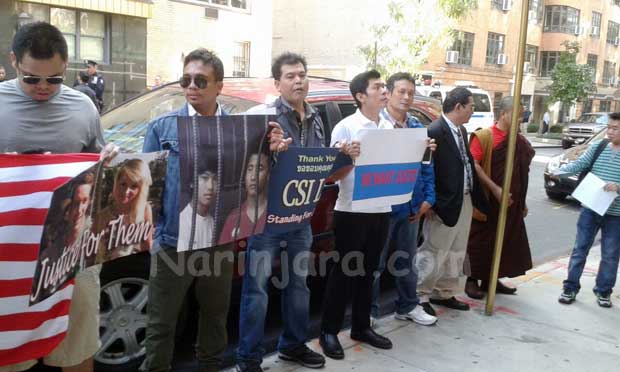 Around 30 Burmese nationals, most of them are Arakanese , staged a demonstration in front of Thai Consulate in New York on Friday demanding justice to two Arakanese migrant workers, who were detained in Thailand in a murder case there, said Ko Khaing Ba Khine, one of the organizers of the event in America.
Around 30 Burmese nationals, most of them are Arakanese , staged a demonstration in front of Thai Consulate in New York on Friday demanding justice to two Arakanese migrant workers, who were detained in Thailand in a murder case there, said Ko Khaing Ba Khine, one of the organizers of the event in America.
The demonstrators, who assembled in front of the Consulate General of Thailand for two hours beginning on 2 pm, urged the Thai government in Bangkok to scrutinize the case fairly, where the two Arakanese youths have been accused of murdering two British citizens namely David Miller (25 years old) and Hannah Witheridge (23) […]
• •69th Session of the UN General Assembly – Situation of human rights in Myanmar: Report of the Special Rapporteur on the situation of human rights in Myanmar
I. The mandate of the Special Rapporteur on the situation of human rights in Myanmar was established pursuant to Commission on Human Rights resolution 1992/58 and recently extended by Human Rights Council resolution 25/26. The present report is submitted pursuant to Council resolution 25/26 and General Assembly resolution 68/242.
II. Background
2. Following the completion of the term of the previous mandate holder, the current mandate holder took up her functions only in June 2014, which resulted in a shorter period than usual to conduct a country visit and review the information gathered. The present report therefore sets out the Special Rapporteur’s preliminary observations, to be supplemented by her oral statement to the General Assembly […]
• • •Smattering of Rangoon Protesters Greet Thai PM Over Koh Tao Murder Case
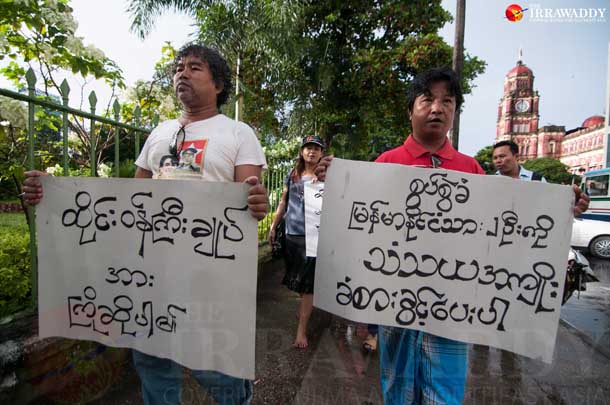 RANGOON — A smattering of Burmese activists held two days of protests against the arrest of a pair of Burmese migrants accused of murdering two tourists on southern Thailand’s Koh Tao island last month, as Thai Prime Minister Prayuth Chan-ocha arrived in Rangoon on Friday for the second day of his first overseas trip since taking the helm of the military-ruled country.
RANGOON — A smattering of Burmese activists held two days of protests against the arrest of a pair of Burmese migrants accused of murdering two tourists on southern Thailand’s Koh Tao island last month, as Thai Prime Minister Prayuth Chan-ocha arrived in Rangoon on Friday for the second day of his first overseas trip since taking the helm of the military-ruled country.
A group of about 20 Burmese led by the Movement for Democracy Current Force held a protest and prayer vigil at downtown Rangoon’s Sule Pagoda on Thursday evening, holding placards that urged the former general turned prime minister “to let the accused two Burmese receive the benefit of the doubt.” […]
• •“Winds of Change” Blow a Gale of Human Rights Abuses
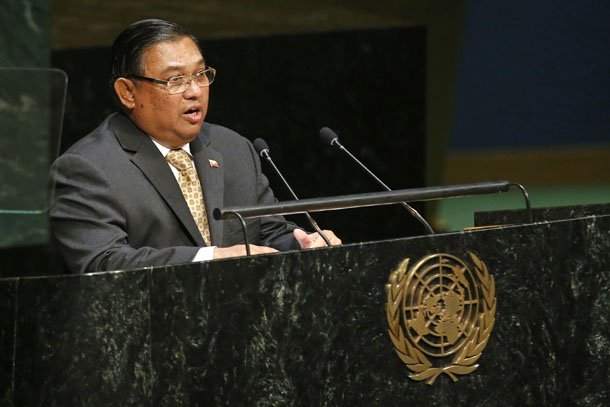 Burma’s Foreign Minister, Wunna Maung Lwin, gave a glowing report on the progress towards democracy and respect for human rights in Burma at the UN General Assembly (UNGA) yet given the deteriorating human rights situation on the ground, it is difficult not to view his words as a North Korean-esque sting in the tail.
Burma’s Foreign Minister, Wunna Maung Lwin, gave a glowing report on the progress towards democracy and respect for human rights in Burma at the UN General Assembly (UNGA) yet given the deteriorating human rights situation on the ground, it is difficult not to view his words as a North Korean-esque sting in the tail.
Wunna Maung Lwin specifically requested that Burma be taken off the agenda of the Human Rights Council as well as the Third Committee of the UNGA, citing that “all major concerns related to human rights have been addressed to a larger extent in the new Myanmar.” Yet on closer inspection, this statement is preposterous, with the realities on the ground providing a striking contrast to these words.
Remarking on the peace process, the government is apparently “serious in its commitment” to making this work. The problem is that the government and the Burma Army say and do different things. As the government is making promises to ethnic armed groups, the Burma Army is still launching offensives in Kachin State and northern Shan State. Even with groups that have a ceasefire, the Burma Army continues its aggression, as seen in Kyeithi Township, Shan State over the weekend where it attacked Shan State Army – North positions yet again. Around 300 villagers have been forced to flee in this township alone in recent months due to attacks. This is emblematic of the current state of the peace process, where too much attention has been placed on the signing of a nationwide ceasefire agreement. Yet as recent clashes indicate, a ceasefire simply isn’t enough to rein in the Burma Army, and this state of affairs remains volatile, as the recent briefing paper produced by Burma Partnership explains […]
• • •Burma: Government Plan Would Segregate Rohingya
(New York) – A draft government plan would entrench discriminatory policies that deprive Rohingya Muslims in Burma of citizenship and lead to the forced resettlement of over 130,000 displaced Rohingya into closed camps, Human Rights Watch said today. Burma’s international donors, the United Nations, and other influential actors should press the government to substantively revise or rescind its “Rakhine State Action Plan.” […]
• • •
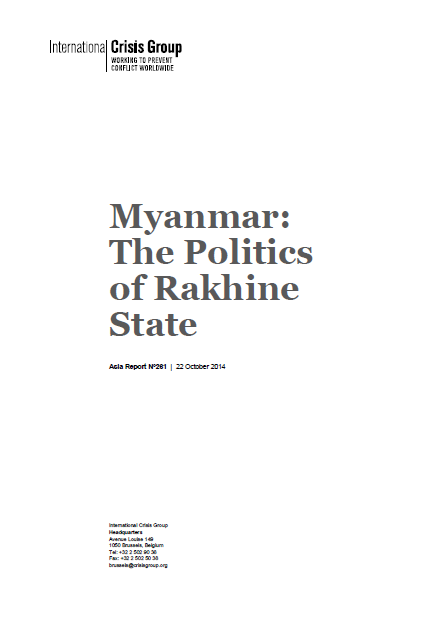
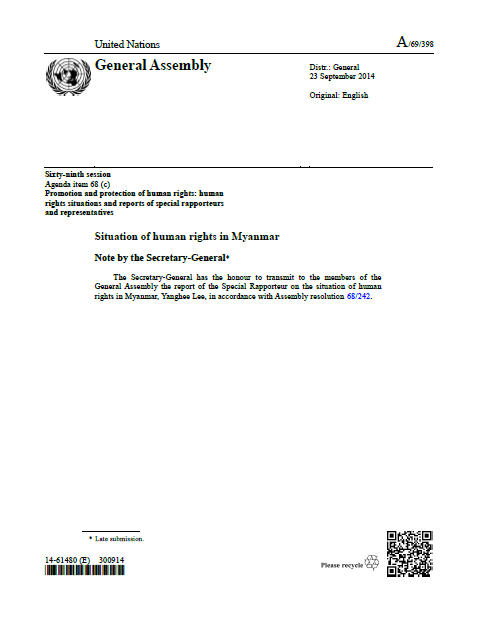








 All posts
All posts